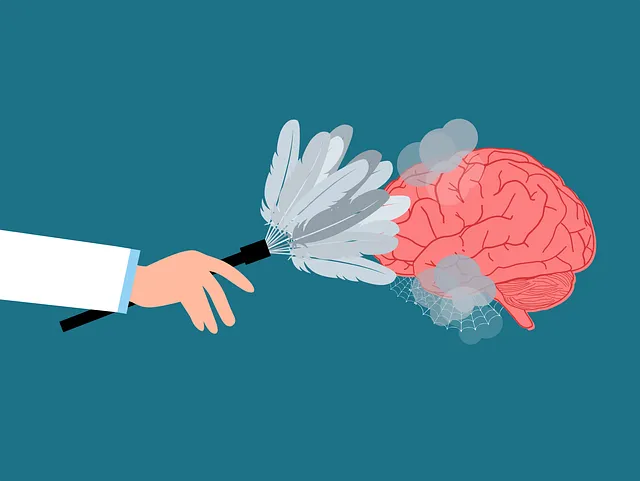Littleton Kaiser Permanente's mental health coverage initiative promotes positive thinking through gratitude, mindfulness meditation, and reframing negative thoughts, improving mental wellness and resilience. Their tailored exercises, from universal mindfulness to cultural-specific therapies, supported by a podcast series, enhance accessibility for diverse populations. Incorporating these practices into daily routines—like reflection, breath awareness, and gratitude writing—leads to long-term benefits, including reduced stress, improved moods, and enhanced overall well-being, as measured through research.
Discover the transformative power of positive thinking with our comprehensive guide. Explore how Littleton Kaiser Permanente’s mental health coverage plays a pivotal role in fostering well-being through innovative programs. Learn effective strategies for designing tailored positive thinking exercises catering to diverse populations. Uncover practical tips to seamlessly integrate these practices into daily life, leading to improved mental health outcomes. Additionally, we delve into measuring the long-term benefits of such initiatives, highlighting their profound impact on individuals and communities.
- Understanding Positive Thinking and Its Impact on Mental Health
- The Role of Littleton Kaiser Permanente Mental Health Coverage in Promoting Well-being
- Designing Effective Positive Thinking Exercises for Different Populations
- Integrating Positive Thinking into Daily Routines: Tips and Strategies
- Measuring Success and Long-term Benefits of Positive Thinking Programs
Understanding Positive Thinking and Its Impact on Mental Health

Positive thinking is a powerful tool that can significantly impact our mental health and overall well-being. It involves cultivating optimistic thoughts, beliefs, and attitudes, which in turn can influence how we perceive and interact with the world around us. This simple yet profound practice has been recognized as an essential component of mental health promotion by organizations like Kaiser Permanente. For instance, Littleton Kaiser Permanente’s mental health coverage highlights the importance of positive thinking exercises as part of a comprehensive care approach.
By embracing positive thinking principles, such as focusing on gratitude, reframing negative thoughts, and practicing mindfulness meditation, individuals can enhance their mental wellness. Mindfulness meditation, for example, is a technique that encourages being fully present in the moment, observing thoughts without judgment. This practice has been shown to reduce stress, improve focus, and foster a deeper sense of calm, all of which contribute to better mental health. The Mind Over Matter principles underlying these exercises empower individuals to take control of their thoughts and emotions, ultimately leading to improved resilience and overall life satisfaction.
The Role of Littleton Kaiser Permanente Mental Health Coverage in Promoting Well-being

The Littleton Kaiser Permanente mental health coverage plays a pivotal role in promoting well-being within the community. This comprehensive program recognizes that mental health is an integral part of overall wellness, and as such, it offers a range of services designed to support individuals in managing their mental health proactively. By integrating mental health awareness into primary care, patients have easier access to resources that can prevent, treat, and manage mental health conditions effectively.
This coverage encourages a culture of open dialogue around mental health issues, which is crucial for reducing stigma. Through public awareness campaigns development and education initiatives, Kaiser Permanente fosters an environment where individuals feel empowered to seek help without fear of judgment. The result is a boost in confidence among patients, enabling them to lead happier, healthier lives.
Designing Effective Positive Thinking Exercises for Different Populations

Designing effective positive thinking exercises requires tailoring them to specific populations, considering their unique needs and backgrounds. For instance, a mental health program at Littleton Kaiser Permanente might offer tailored sessions for different age groups—children, adolescents, adults, and seniors—each with distinct cognitive and emotional development levels. Exercises could range from guided mindfulness meditations suitable for all ages to creative outlets like art therapy or music appreciation for younger participants, while older adults might benefit from gentle yoga or reminiscence therapy.
Cultural sensitivity is paramount in mental healthcare practice, so these exercises should incorporate diverse cultural perspectives and practices. For example, incorporating traditional healing methods or addressing specific stressors within various communities can enhance engagement and accessibility. Moreover, integrating these exercises into a structured Mental Wellness Podcast Series Production can provide ongoing support, offering accessible Stress Reduction Methods for individuals who prefer audio content or those seeking supplemental resources alongside their mental health coverage from Littleton Kaiser Permanente.
Integrating Positive Thinking into Daily Routines: Tips and Strategies

Incorporating positive thinking into your daily routine is a powerful tool for enhancing mental well-being and overall happiness, especially when supported by Littleton Kaiser Permanente mental health coverage. Start by setting aside dedicated time each day for reflection and practice. This could be as simple as waking up five minutes earlier to sit in silence with your thoughts, or engaging in a brief meditation practice. Focus on breath awareness and let go of negative thoughts as they arise, replacing them with affirmations that nurture Self-Esteem Improvement. Incorporate gratitude exercises into your morning routine by writing down three things you’re thankful for; this simple act can shift your mindset towards positivity throughout the day.
Consider adopting Compassion Cultivation Practices to foster a kinder inner dialogue. Treat yourself with the same compassion and understanding you would offer a friend, especially when facing challenges. Regularly engage in activities that align with Mind Over Matter Principles, such as practicing hobbies, spending time in nature, or engaging in creative pursuits. These activities provide opportunities for self-expression and help to rewire negative thought patterns. Remember, consistency is key; make these practices part of your regular routine, just like brushing your teeth, to reap the long-term benefits.
Measuring Success and Long-term Benefits of Positive Thinking Programs

Measuring success and identifying long-term benefits are essential components of any positive thinking exercise implementation, especially when considering programs like those offered by Littleton Kaiser Permanente mental health coverage. Evaluating the impact of such initiatives goes beyond immediate outcomes. It involves tracking changes in participants’ overall well-being, including reductions in stress levels, improved mood, and enhanced resilience over time.
Public Awareness Campaigns Development centered around positive thinking often aim to foster mental wellness within communities. By measuring long-term benefits, researchers and mental health professionals can demonstrate the sustainability of these programs. This includes assessing how participants maintain their newfound optimism, adapt Mind Over Matter Principles in daily life, and continue to thrive even after the formal exercises conclude. Such insights contribute to a growing body of knowledge, guiding future initiatives and enhancing the overall effectiveness of positive thinking interventions.
Implementing positive thinking exercises, with support from comprehensive mental health coverage like that offered by Littleton Kaiser Permanente, can significantly enhance well-being. By tailoring these practices to diverse populations and seamlessly integrating them into daily routines, individuals can cultivate resilience, improve mental health outcomes, and experience long-term benefits. Measuring success through both subjective reports and objective data allows for continuous improvement, ensuring these programs remain effective and impactful.






